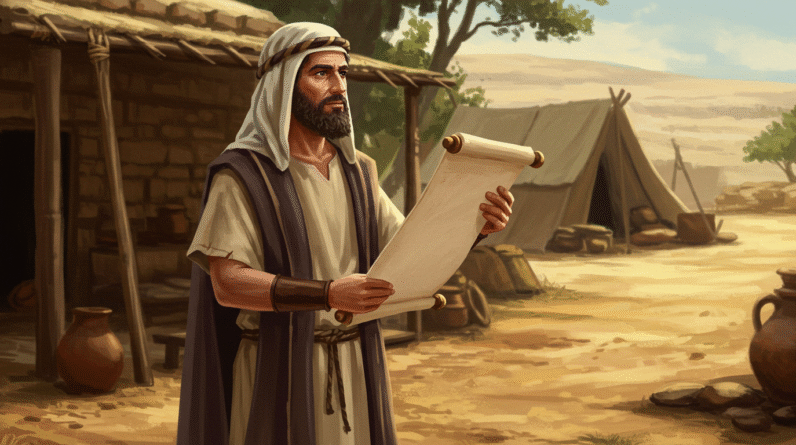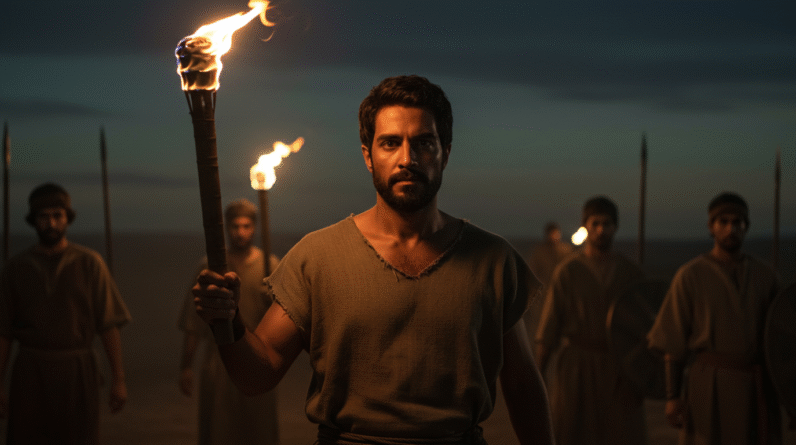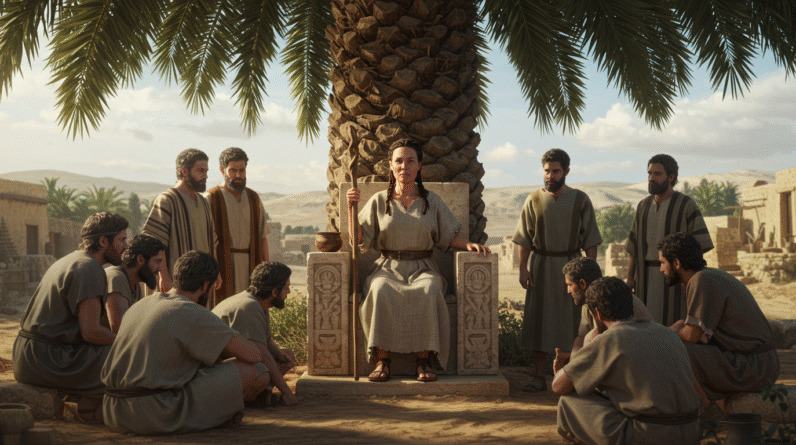Jephthah’s Courage: How One Outcast Became Israel’s Deliverer
There’s something about an underdog story that tugs at your heartstrings, isn’t there? Tales of overlooked individuals who rise to unexpected prominence might seem like plots crafted for modern storytelling, but they are deeply woven into the fabric of human history. One such remarkable tale is that of Jephthah, an outcast who delivered Israel from their enemies. This isn’t just a story of battle and redemption—it’s a testament to how courage can be found in the most unlikely places, and how faith and leadership can emerge under the toughest circumstances.
The Unlikely Hero
In the roster of biblical heroes, Jephthah might not be the most familiar name, but his story resonates powerfully with themes of courage and overcoming adversity. His journey begins with a significant disadvantage—Jephthah was born into societal rejection. His dad, Gilead, had an affair with a prostitute, and as a result, Jephthah was seen as illegitimate. You can imagine how this tainted his standing in his family and wider community. Yet, as life’s narrative unfolds, the very qualities he honed in adversity became focal to his leadership.
According to the Book of Judges, Jephthah was eventually driven away by his half-brothers. They didn’t want him to share in their inheritance since he was the son of an “illegitimate” mother (Judges 11:1-3). Talk about sibling drama! It’s easy to draw parallels to modern stories of family strains and societal judgments. In running away, Jephthah became a leader of a group of outcasts, further solidifying his reputation as one disconnected from traditional acceptance or success.
A Call to Courage
But here’s where the story takes an unexpected turn. Jephthah’s skills as a leader and a warrior caught the attention of the Israelites when the Ammonites waged war against them. Isn’t it intriguing? The very people who pushed him away suddenly found themselves in need of the very qualities they feared and disdained.
In a twist of fate, the elders of Gilead approached Jephthah, asking him to lead their army against the Ammonites. You can almost feel his inner conflict; here were these very people who had wronged him now desperate for his help. Yet, Jephthah didn’t just jump at the opportunity. He negotiated terms that would ensure his leadership should he win this battle—a testament to his strategic mindset and vision (Judges 11:4-11).
The Vow and Its Consequences
The story intensifies as Jephthah makes a vow to God, a promise born of desperation and determination. If only he could win the battle against the Ammonites, he would sacrifice the first thing that came out of his house to God—a testament to Jephthah’s mix of faith and rashness (Judges 11:30-31).
We’ve been there, haven’t we? Promising grand gestures in moments of desperation, believing it will turn the tide in our favor. There’s an emotional honesty in Jephthah’s vow that makes him so human—sometimes we reach beyond our means, hoping that extraordinary promises might sway the cosmos.
Jephthah’s subsequent victory wasn’t merely a testament to his military prowess. It was a narrative of divine intervention, where God used an unlikely person as an agent of salvation for Israel. The victory was not just Jephthah’s; it was a reclaiming of dignity and purpose among a people long oppressed.
The Heartbreaking Aftermath
Then, joy collides with the most poignant moment of his life. As he heads home to the echoes of victory, Jephthah is met by his only daughter, dancing to welcome him. His heart shatters as he realizes the fulfillment of his vow meant the sacrifice of his child (Judges 11:34-35).
This is the visceral, unsweetened aspect of Jephthah’s story. It echoes with the irretrievability of choices made in haste and determination. Yet, it’s not devoid of meaning or redemption. The narrative invites you to wrestle with the idea of sacrifice and the complex interweaving of faith and choice.

Jephthah’s Legacy
While the outcome of Jephthah’s vow is tragic, his legacy wasn’t born from perfection but from resilience. His story addresses the capacity for those who feel sidelined and undervalued to rise above their circumstances. Jephthah demonstrates that leadership doesn’t come from flawless backgrounds but from courage, determination, and adaptability. This theology helps you mull over how the cross-currents of lived experience shape our destinies.
In the greater chronicles of Israel, Jephthah’s tenure as a judge is marked not by his origins, but by his decisive, although imperfect, leadership. His life challenges you to consider what you deem outsiders and underdog figures can contribute to their community and, further, to God’s broader narrative of salvation.
Life Application: Embracing the Outsider
Jephthah’s tale compels reflection on contemporary themes of familial rejection, societal acceptance, and personal resilience. Drawing from his journey, you can find inspiration for your own life. Perhaps, like Jephthah, you’ve felt the sting of rejection or the burden of labels others place on you. You’re encouraged to harness those experiences to unlock potential, much like he did.
Faith plays an integral role—trusting that you have a purpose. The story of Jephthah invites you to see beyond immediate circumstances, understanding that God works often through the least expected channels. This narrative encourages you to welcome diverse backgrounds and experiences, crafting a tapestry rich with varied threads.
Moreover, the stark realities of Jephthah’s vow challenge you to consider the implications of your promises and decisions. It’s a call to weigh carefully the words we speak and the promises we make, especially in matters of faith and devotion.
Conclusion
Jephthah reminds you that courage and leadership can emerge from the most unexpected places. His life is not just a biblical account but a motivational voyage through adversity, faith, and fulfillment of purpose. It’s a call to recognize and embrace potential within yourself and others, regardless of the societal labels that might obscure that potential.
As you navigate your personal and spiritual journey, consider how you might draw strength from Jephthah’s example. Look into those forgotten corners and sidelined stories. Embrace and encourage them, for they hold a rich, resonating potential.
Explore More
For further reading and encouragement, check out these posts:
👉 7 Bible Verses About Faith in Hard Times
👉 Job’s Faith: What We Can Learn From His Trials
👉 How To Trust God When Everything Falls Apart
👉 Why God Allows Suffering – A Biblical Perspective
👉 Faith Over Fear: How To Stand Strong In Uncertain Seasons
👉 How To Encourage Someone Struggling With Their Faith
👉 5 Prayers for Strength When You’re Feeling Weak

📘 Jesus and the Woman Caught in Adultery – Grace and Mercy Over Judgement
A powerful retelling of John 8:1–11. This book brings to life the depth of forgiveness, mercy, and God’s unwavering love.
👉 Check it now on Amazon
As a ClickBank Affiliate, I earn from qualifying purchases.
Acknowledgment: All Bible verses referenced in this article were accessed via Bible Gateway (or Bible Hub).
“Want to explore more? Check out our latest post on Why Jesus? and discover the life-changing truth of the Gospel!”








